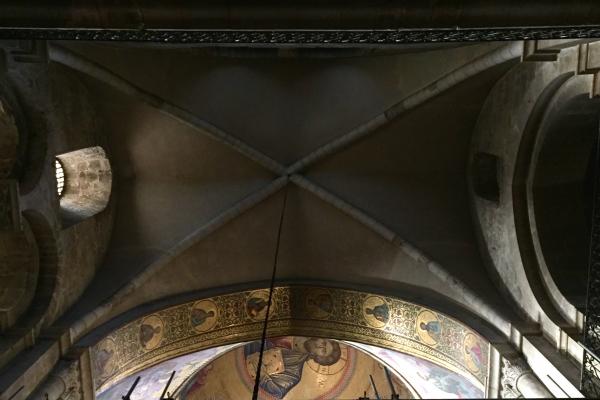Editor's Note: Jeff Chu is on a weeklong group pilgrimage to Rome and the Holy Land, sponsored by the Museum of the Bible. Read parts one, two, three, four, and five here.
The pilgrim is the anti-hermit. You could argue, I suppose, that their ends are typically the same — to draw nearer to God, to connect with spiritual tradition, to seek truth and understand wisdom. But their means are different. While the hermit withdraws from people, the pilgrim joins others on a collective journey.
I pretend to be a hermit. I’m shy and always have been. I’m introverted, too, which isn’t the same thing; being with others, especially in large groups, simply saps my energy.
But in my heart, I want to be the pilgrim. One obstacle: Despite the Bible’s repeated admonitions not to be afraid, I am. Yes, I fear disappointing God. But — true confession — my greater fear on this trip, and a sign, no doubt, of my mixed-up priorities, was that I might somehow be deemed unworthy, unwanted, by my fellow pilgrims. (Shout-out to my fellow Enneagram Sixes!)
--
My obsession with my own fears and shortcomings reflects no small amount of selfishness. We don’t come to pilgrimage as sanctified souls — we bring with us the dirt and dust of this world.
To some degree, this just seems rude. Shouldn’t we cleanse ourselves for opportunities like these? That I even get to go on pilgrimage is a sign of privilege. Throughout history, says Arizona State University geographer Dallen Timothy, who studies the tradition, “pilgrimage for most Christians has been a luxury item, an option. Whereas in Islam, you have to do it, in Christianity, you don’t. As the globe is opening up more, pilgrimage is growing as a form of travel.”
Going on pilgrimage does not reflect holiness or purity. “Most people are doing it for a mixture of reasons: a bit of pleasure, interest in seeing places, a bit of faith and identity with a deity. There can be quasi-political reasons. There’s often hope for personal intervention in your life — to feel better, to clean themselves,” says Ian Reader, a professor emeritus at the University of Manchester and author of the book Pilgrimage: A Very Short Introduction. “There are so many multiplicities there.”
And so much wishful thinking.
On our last morning in Jerusalem, my friend and fellow pilgrim Melissa Greene and I woke early to head for the Old City before our official itinerary began.
At the Church of the Holy Sepulchre, we visited the various chapels, starting with the side-by-side Greek Orthodox and Roman Catholic ones built atop the reputed site of Christ’s crucifixion. Then I wanted to take Melissa to light candles in the Coptic chapel where I’d been a few days before, a glowing, otherworldly space that I’d found just divine. But there was a service in progress. While she was lighting a candle in a space outside that chapel, a procession of priests and monks basically shoved her out of the way.
As we walked back to our hotel through the still-empty streets of the Old City, we talked about our mutual lack of certainty, about the role that doubt plays in — and maybe even defines — our faith. I confessed that the most accurate label for me, as much as I dislike them, is “Christian agnostic.” I don’t believe I can know in this lifetime much of the truth about God, or even whether God exists. While I choose to live as a follower of Jesus, I confess hope but no certainty that he is divine. And while I hope that the Holy Spirit might be directing my path — and while I read some moments in my life as more than mere coincidence — I have trouble saying with much resolve that a divine hand has directed my path or corrected my thoughts and actions.
Where is the line between embracing faith’s mysteries and wallowing in doubt? Is it humility that compels me to question God’s providence or even God’s existence — or is it less virtuous? If it is true, does it even matter?
By the time we emerged from the semi-dark warren of streets that defines much of the Old City, the Jerusalem stone around us glowed in the early-morning light. We hadn’t eaten breakfast. So just inside the Jaffa Gate, I stopped to buy a sesame bread ring, called ka’ak, from a street vendor. (Later, our tour guide saw me eating a remnant of it and insisted it was a Jerusalem bagel — something that the Arab baker would no doubt have disputed. Hello, politics of food and naming!)
We tore off pieces and ate as we walked. I thought we could have used some wine.
--
“Communion” has come to have a particular meaning, in church talk, that centers on a specific sacrament: Bread. Wine (or, if you must, grape juice). The Table of the Lord.
But if you look at its etymology, the word has a broader significance. It’s rooted in an old French word that means “community,” which is in turn derived from a Latin word that means “sharing,” or “participating together.”
Openness feeds communion. It demands the opposite of solitude. Pilgrimage — whether you’re traveling solo along, say, the Way to Santiago de Compostela, joining yourself to the legions have gone before, or, like me, journeying with a group — is communion, or at least it can be, if your head and heart are pointed in the right direction.
In some ways, I’ve learned more over the past eight days in transit with my fellow travelers than I did standing in the ancient holy places.
Maybe I hoped that God would send me a special message as I lit candles at the Holy Sepulchre; instead, I think God spoke love and grace through Melissa and her husband, Ben, as we’ve walked together and shared our stories — from the bruises of life and the worries of work to the profound joys of our personal havens — with each other.
I wished God would deliver, lightning-bolt style, some revelation as I knelt in prayer at St. Peter’s in Rome; later, though, I suspect God delivered encouragement and exhortation through Josh, as he offered some unsolicited counsel about my writing and its potential, over sparkling wine and airplane bread, as we flew to Jerusalem.
I wanted God to give me a flash of clarity for big decisions about my future as I walked in the places where Jesus pondered his; what I got were hints and nudges, including an offhand comment from Jennie — sharing a gut reaction to something she saw on my Instagram feed — as we strolled through the excavated remnants of the City of David.
I dreamed God would shout validation as I stood in prayer at the Western Wall; what I received was a word from Crystal. She differs with me on some significant theological points — and made that clear. Yet she also felt compelled to pull me aside one evening as we stood in a restaurant after dinner, simply to give me a hug and say, “I know you struggle with feeling unworthy. And I just want to tell you: You are worthy.”
I imagined that as I walked the Via Dolorosa, stopping at some of the stations of the Cross, God might reveal some truth to transform my peripatetic spiritual discipline; what I was given was an impromptu Torah lesson from Rabbi Yitzchok Adlerstein as we sat in the shade of a Jerusalem garden, waiting for the rest of the group to finish a tour.
I’ve written a lot over recent days about visiting storied churches and historic sites, but the most sacred I’ve found have actually been new and temporary. They’re the liminal spaces — the third row of a tour bus, the deck of a boat, the rear bench of a Jeep — where conversation gradually morphs into communion. They’re the holy places that pop up when we gather and then fade away when we part.
As this trip nears its end, I’m beginning to think about how it will affect my quotidian life. My tendency and my temptation, I know, will always be to act like the hermit, to justify my shyness and introversion not out of devotion to something greater but in fear of something less. If I take anything back with me, I hope it will be the heart of a pilgrim: The courage required for true communion. The grace — for myself and others — to live in the tensions this inevitably brings. The love that endures.
Got something to say about what you're reading? We value your feedback!

